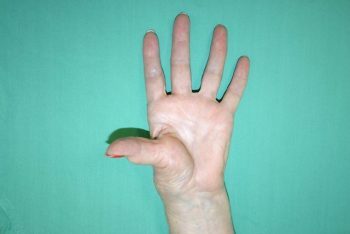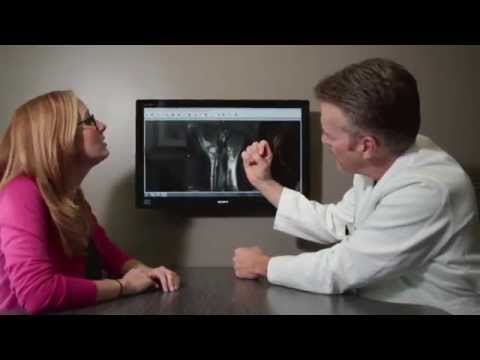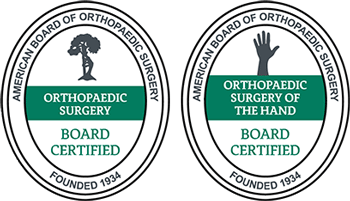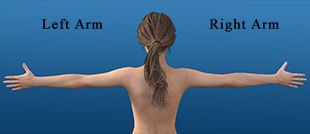Different Types of Arthritis and Their Causes
Arthritis is a broad term that describes various conditions that affect the joints, connective tissues, and the tissue around the joints in your body. While symptoms vary, the most common symptoms are stiffness and pain in the joints. When this pain occurs in the wrist or hands, it can make performing simple, daily tasks difficult.
There are many types of arthritis, and most of them are chronic diseases. Let’s examine arthritis types, causes, and what you can do to ease your pain. At The Hand and Wrist Institute, we focus on helping you live a life without joint pain.
What Causes Arthritis?

“thumb arthritis – resting posture 2” By handarmdoc licensed under CC BY 2.0
Arthritis is a broad term used for conditions that affect the joints in the body. Some forms of arthritis are caused by joint inflammation. Other causes include injuries, wear and tear of the affected joint caused by overuse, autoimmune disorders, and obesity. It can also be genetic. Arthritis can start at any age, but it’s most commonly noticed in those between 40 and 60. Arthritis is also more common in women than men.
Arthritis can range from mild to severe. It’s common in the wrist, knuckles, knees, hips, and ankles. A proper diagnosis from a doctor is necessary to ensure you’re receiving the right treatments.
Different Types of Arthritis
There are many different types of arthritis, but a few commonly affect the wrist. These include:
Osteoarthritis
Osteoarthritis is a type of arthritis that develops as you age. It’s a wearing down of cartilage and is typically the result of years of wear and tear on the wrist joint. It’s the most common form of arthritis, also known as degenerative joint disease. Osteoarthritis can cause stiffness, swelling, and pain, and in more severe cases, it can even reduce the function of your wrists or hands. Over 32.5 million people in the United States suffer from osteoarthritis.
Post-Traumatic Arthritis
This condition can develop after an injury, such as a sprain or a broken bone. Post-traumatic arthritis can develop years after the damage occurs, even if the bones and ligaments heal correctly. Common symptoms include swelling, pain, and an accumulation of fluid in the joints.
Rheumatoid Arthritis
Rheumatoid arthritis is a type of autoimmune disease and often starts in smaller joints, such as those in the wrist. It typically will occur on both sides of your body. This occurs because your immune system attacks and damages the healthy cells, resulting in pain, swelling, and reduced movement.
Psoriatic Arthritis
This is another form that is caused by an autoimmune disease. Psoriasis is a disease that causes scaly patches on your skin. Some people who suffer from this also have psoriatic arthritis in their wrists.
Gout
Gout occurs when your body has too much uric acid and cannot eliminate it. Uric acid is a waste product produced when you digest food, and this excess acid causes small crystals to form in the joints, which causes pain. Gout usually attacks the toes first but is also seen in the hands.
The only way to determine if you have arthritis and what type you have is to see a doctor. If you’re experiencing symptoms, it’s best to schedule an appointment as soon as possible to help prevent the worsening of your symptoms and help with pain relief. A hand specialist, such as Dr. Knight of The Hand and Wrist Institute, will provide you with a thorough diagnosis.
Symptoms of Arthritis
The symptoms of arthritis can vary from person to person, but if you have arthritis, you’ll almost certainly have the following symptoms:
- Pain in or around the joints.
- Joint swelling.
- Warmth or redness in the joint.
- Reduced movement or stiffness of the joint.
You may also suffer from being over-tired, experience unexplained weight loss, and have a general feeling of being unwell.
How Is Arthritis Diagnosed?
Seeing a doctor is the first step in getting a diagnosis. Your doctor will perform a physical examination and ask you what symptoms you’re experiencing and how frequently your symptoms occur. Your provider may also take an X-ray, CT scan, or ultrasound to look for narrowing of the joint space, loss of cartilage, and a clear image of the joint itself. Blood tests can also be performed to look for the causes of your arthritis.
Non-Surgical Treatment Options for Wrist Arthritis
Treatment options for arthritis depend on the type that you have. Options may include:
- Hand exercises that are approved by a healthcare provider or a physical therapist.
- Limiting or stopping the activities that worsen your wrist pain.
- Alternating hot and cold compresses.
- Splints or braces.
- Steroid injections.
- Nonsteroidal anti-inflammatory drugs or NSAIDS may include pain-relieving creams.
- Disease-modifying antirheumatic drugs that are designed to treat rheumatoid arthritis.
Most patients see some benefit or improvement from these conservative treatments. At The Hand and Wrist Institute, we use current technologies and research to develop a minimally invasive plan to treat your symptoms.
Surgical Treatment Options for Wrist Arthritis
For those patients who do not respond well to conservative non-surgical treatment methods, it may be necessary to proceed with surgery to improve their symptoms. Surgical options vary depending upon which area is affected and whether it’s isolated to a specific area. Advanced technology is used to help you return to your everyday activities sooner. The goal at The Hand and Wrist Institute is to improve your quality of life and pain while improving or preserving hand function.
Call The Hand and Wrist Institute Today
Call The Hand and Wrist Institute today if you’re experiencing joint pain and believe it’s time to see a doctor. Dr. Knight specializes in arthritis of the wrist and hand and has the skill and experience necessary to help treat and alleviate your pain. Give us a call now at 855-558-4263 or schedule your appointment online. We have offices in Southlake and Dallas, and we also offer virtual Skype appointments if you’re outside the Dallas area. The Hand and Wrist Institute team looks forward to helping you and bringing life back into your hands.

























